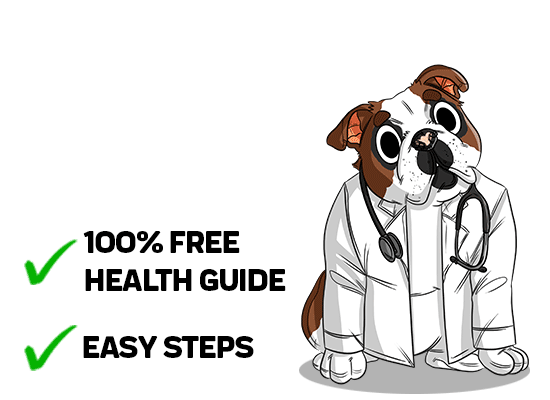- What Is Diabetes In Dogs?
- What causes a dog to get diabetes?
- Dog Diabetes Symptoms
- Dog Diabetes Cost
- Natural Diabetes Help
- How long do dogs live after being diagnosed with diabetes?
- Is There A Cure?
- What happens if diabetes is left untreated in dogs?
- Dog Diabetes Treatment
- CBD For Dog Diabetes
 It's not fun for anyone to deal with diabetes, and this includes pet owners who discover that their furry friend has also come down with insulin resistance.
It's not fun for anyone to deal with diabetes, and this includes pet owners who discover that their furry friend has also come down with insulin resistance.
Luckily, dogs who receive the right treatment for canine diabetes can be expected to live normal lives. Those that are also diagnosed early can also live normal lifespans when they get the care they need. That said, diabetes mellitus can wreak serious havoc on the body without treatment!
Issues like seizures and blindness can plague those who are left untreated, or who aren't treated properly. In more extreme cases, they can also fall into a coma. Because of this, it's important to have a firm understanding of canine diabetes and how to make sure your dog is getting the best treatment possible with your vet's help!
What Is Diabetes In Dogs?
Dog diabetes causes problems with the body's blood glucose levels. Typically, glucose is capable of being turned into physical energy through the use of insulin, which comes from the pancreas. However, in some cases, there can be problems with insulin production which results in an inability to absorb the glucose correctly, this is called insulin resistance.
When this happens, that glucose begins to accrue in the blood, essentially stuck. This results in a number of complications in the body, which can become quite harmful if they progress too far.
It's also important to know that there are a couple of types of diabetes out there. Type 1 diabetes is typically thought to be genetic or due to other DNA-related factors. In this type, there is a lack of insulin production, which can mean that daily insulin therapy shots are required for the sugar to be absorbed well.
On the other hand, type 2 diabetes can often occur in correlation with obesity. It results in the body becoming resistant to insulin, though it is still being made. Many can think of this type as more lifestyle-related in humans, as it occurs when there are too many carbohydrates in the diet of the human or animal, or too much excess weight.
How do you know if your dog has diabetes?
There are many ways your dog may show signs of diabetes. Some common symptoms include increased thirst, increased urination frequency, and increased drinking with small amounts in the water bowl (diabetes can lead to dehydration).
Some additional warning signs that you should watch out for would be weight loss or gain, excessive panting after playing or exercise, a sweet odor from their mouth while they’re breathing heavily due to hyperventilation caused by low blood sugar levels because glucose is converted into carbon dioxide during respiration which causes an increase in acidity), abdominal discomfort as well as vomiting and/or diarrhea.
What causes a dog to get diabetes?
Now that you've seen diabetes explained, it's worth considering the causes of dogs with diabetes. The dog diabetic causes can include a variety of different sources. The cause can really be unique to your pet, their breed, and environmental factors that might come into play. Many dogs that end up with diabetes tend to be older, and there are certain breeds that can be more likely to develop it.
These breeds include:
- Keeshonds
- Pulis
- Samoyeds
- Australian Terriers
- Spitz
- Bichon Frise
- Siberian Huskies
- Cairn Terriers
- Miniature Pinschers
- Poodles
- Schnauzers
- Fox Terriers
While these breeds can be more likely to develop diabetes, that doesn't mean that other breeds are immune. Any dog of any breed can develop it, it's just more likely in certain situations.
In a decent amount of cases of canine diabetes, there is a connection to autoimmune disorders, which results in the pancreas becoming damaged and unable to produce insulin as well. It's also worth noting that because of this, dog pancreatitis can result in them becoming more prone to diabetes.
Things like toxins, obesity, unhealthy diets and Cushing's disease can also result in diabetes. Furthermore, some believe that excessive use of medications can also contribute to the problem.
Dog Diabetes Symptoms

There are a few symptoms to look out for when it comes to diabetes in dogs. Most notably, dogs with diabetes can appear to become much more thirsty. You may find that they go through bowls of water more quickly. In addition, they may also need more trips outside, or begin to have potty accidents around your house. On top of this, you can also notice that your dog has more of an appetite than usual, but seems to be losing weight regardless.
Another symptom to look out for is a diabetic seizure in dogs, which can become quite serious.
Keep in mind that if your dog is normally very good about going outside to use the bathroom and suddenly begins to have problems, it's typically much more likely to be a health problem than a behavioral issue,
In some cases, diabetes may be more advanced by the time you see symptoms. These kinds of symptoms can include things like depression, a lack of energy, lowered appetite or vomiting. To avoid reaching this point, it's a good idea to look out for earlier symptoms, and perhaps check where your dog's blood sugar rests on the dog blood sugar chart. This is something your vet can help with.
Dog Diabetes Cost
In most cases, dogs that have diabetes will need insulin in some form. Often, this comes in the form of daily injections. While this might not be something all owners are too keen on doing, it's worth noting that dogs typically can barely feel the needles, as they are so thin.
Typically, there can be quite a range for the cost of insulin. Bottles may be anywhere from $30-$120 for each bottle. In addition to this, you'll typically need needles, strips for testing and syringes. It's also worth noting that each bottle usually holds out for about a month.
Natural Diabetes Help
In humans, diet can be a huge factor in keeping the condition in check or even sometimes sending it into remission. However, the same isn't true in dogs to the same extent. That said, there are a few things worth keeping in mind to help your diabetic dog with being as healthy as possible. Two main factors are diet and exercise.
Diet
There are two aspects to make sure you have in check to keep your dog healthy. These include ensuring they are fed on a regular basis and keeping their weight at a healthy level. The good news is that your vet will be able to give you detailed information on the best food, feeding schedules, and more for your diabetic pet.
This will often mean ensuring they have food that is high quality, though it doesn't generally have to be a prescription food. You'll also need to make sure that you keep track of your dog's blood sugar while they are getting used to the new food.
Some also choose to use special treats for diabetic dogs, which can include those that are more friendly to their nutritional needs or CBD treats for dogs. The differences between CBD and diabetes allow such treats to be useful in easing the symptoms.
Exercise
Just like in humans, exercise is useful for helping dogs to stay in good shape, maintain a healthy weight, and aid in weight loss. This is really going to be helpful in allowing diabetic dogs to stay as healthy as they can. With regular exercise, a healthy weight, and well-managed symptoms, dogs can often continue to live happy lives and have a decent lifespan.
You can help your dog to get exercise by taking them for regular walks, playing with them often and giving them reasons to be more active and live a healthy life. This can also be a great way to help with keeping yourself in shape as well!
Other Aspects To Think About
When you change your dog's diet, it can be hard to judge how your dog will react. Because of this, it's a good idea to practice home monitoring your dog's body, blood sugar, and behaviors in order to report issues to your vet.
Diabetes In Cats
Diabetes is also an issue that can occur in cats. Because of this, cat owners will want to do some research on the symptoms diabetic cats may show, learn how to provide the best treatments and provide a diet that helps to avoid or manage the problem. Diabetic cat treats can also be a great idea!
How long do dogs live after being diagnosed with diabetes?
The key to giving your dogs and cats the best chances for a full life expectancy is to make sure their diabetes is managed well. This means regular treatments with insulin, exercise, and a healthy diet. When these things are in line, diabetic dogs can still live full healthy lives.
However, holding off on treatment for diabetes or allowing those treatments to slip can result in serious complications. Diabetes can take a decent amount of work to keep glucose levels in check, but it's worthwhile for those who want to give their dog the best possible quality of life.
Is There A Cure?
This can partially depend on the type of diabetes that your dog has. Largely, type one diabetes isn't known to have a cure. That said, there is currently research going on that may be able to assist in causing this type of diabetes to begin remission.
That said, there is a possibility of curing type two diabetes with exercise, a healthy diet and loss of any excess weight. Because of that, it's even more important to make sure that you're providing all of the care your diabetic dog needs in order to potentially allow for remission to occur.
What happens if diabetes is left untreated in dogs?
Diabetic dogs are at risk for foot problems, blindness, heart disease, and kidney failure. The long-term effects of diabetes in your pet can be severe if left untreated. Diabetic pets have an increased risk for complications such as painful infections in their paws or skin folds; eye disorders like glaucoma which affects a dog's ability to see; congestive heart failure that is the result of high blood pressure caused by obesity due to improper dieting. They will lack insulin production from not eating anything with sugar; renal insufficiency where kidneys stop producing urine effectively causing lethargy and coma even death when levels of glucose in the blood get too low. Proper glucose monitoring is necessary for a healthy diet in a dog with diabetes.
Dog Diabetes Treatment
When it comes to medications, diabetes in dogs is typically assisted with the help of insulin injections. If you're concerned about providing these injections, then make sure you talk to your vet about the process. They can help to assuage your concerns and give you the knowledge you need to help your pet.
CBD For Dog Diabetes

It should be said that CBD cannot cure diabetes, but it can be helpful in managing the symptoms. This is especially true for symptoms that can take place with type two diabetes. Some can find that it can assist in avoiding complications, which can elevate the seriousness of the illness.
CBD oil for diabetes can be helpful with some of the symptoms that can result in seizures. Some can also find that using CBD with diabetes can help with issues that may result in blindness or other problems in the body that come as a result of the wear and tear from the disease.
For any medical condition affecting your pet, it is absolutely critical that you consult a licensed Veterinarian. If the approved medications or treatments for diabetes are not an option, then ask your veterinarian about the potential benefits and risks of natural alternatives that are being studied such as CBD.
Diabetes In Dogs: The Bottom Line
While it can be scary to learn that you have a dog with diabetes, it can help to know that it's often a highly manageable condition. In some cases, it can even be reversed if it has been caught early and receives correct treatment. With the right care, your dog can still live a long, happy life!
If you're planning to use CBD for your dog's diabetes, you'll want to make sure that you use the best CBD oil for diabetes possible, and that you have a solid understanding of how to use CBD for diabetes. There are certainly some benefits to be gained for dogs with diabetes.
Alongside the prescriptions and recommendations made by your vet, it helps to know that you also have the option of using CBD to help with keeping your dog in good shape. It's just one more tool that pet owners can use to help with easing symptoms and keeping their dog happy!
Sources:
Diabetes Mellitus in Dogs and Cats
Approved by:
Dr. Ivana Vukasinovic
Doctor of Veterinary Medicine, University of Belgrade

Ivana Vukasinovic grew up in Serbia and attended the University of Belgrade where she received a degree in Veterinary medicine in 2012 and later completed surgical residency working mostly with livestock. Her first year of practice was split between busy small animal practice and emergency clinic, and after two more years of treating many different species of animals, she opened her own veterinary pharmacy where an interest in canine and feline nutrition emerged with an accent on fighting animal obesity. In her free time, she acts as a foster parent for stray animals before their adoption, likes to read SF books and making salted caramel cookies.
Thanks for stopping by!
P.S. We Love You!
Sincerely,
The Innovet Team
Please do not ask for emergency or specific medical questions about your pets in the comments. Innovet Pet Products is unable to provide you with specific medical advice or counseling. A detailed physical exam, patient history, and an established veterinarian are required to provide specific medical advice. If you are worried that your pet requires emergency attention or if you have specific medical questions related to your pet’s current or chronic health conditions, please contact or visit your local/preferred veterinarian, an animal-specific poison control hotline, or your local emergency veterinary care center.
Please share your experiences and stories, your opinions and feedback about this blog, or what you've learned that you'd like to share with others.
LEARN MORE
Best Selling












 CBD Oil for Dogs
CBD Oil for Dogs Advanced Mobility Support Chews for Dogs
Advanced Mobility Support Chews for Dogs All Natural Oatmeal & Honey Shampoo + Conditioner for Dogs
All Natural Oatmeal & Honey Shampoo + Conditioner for Dogs CBD Dog Treats
CBD Dog Treats




